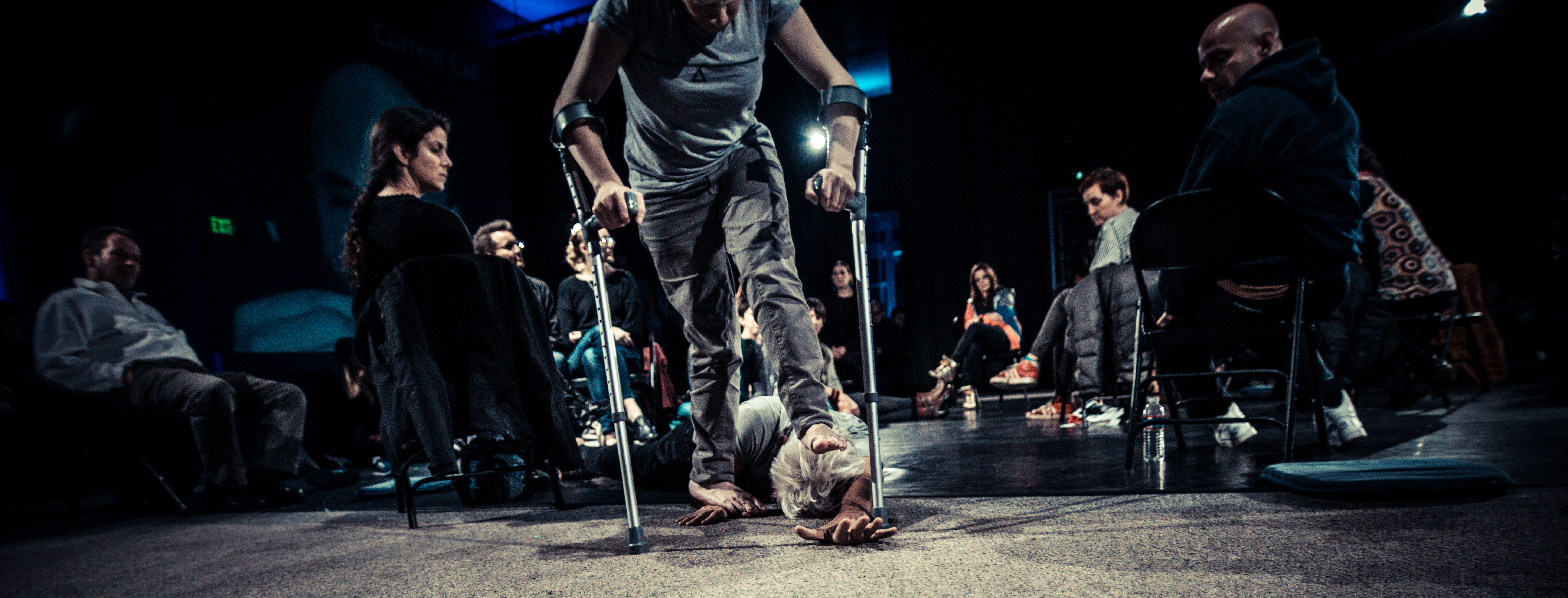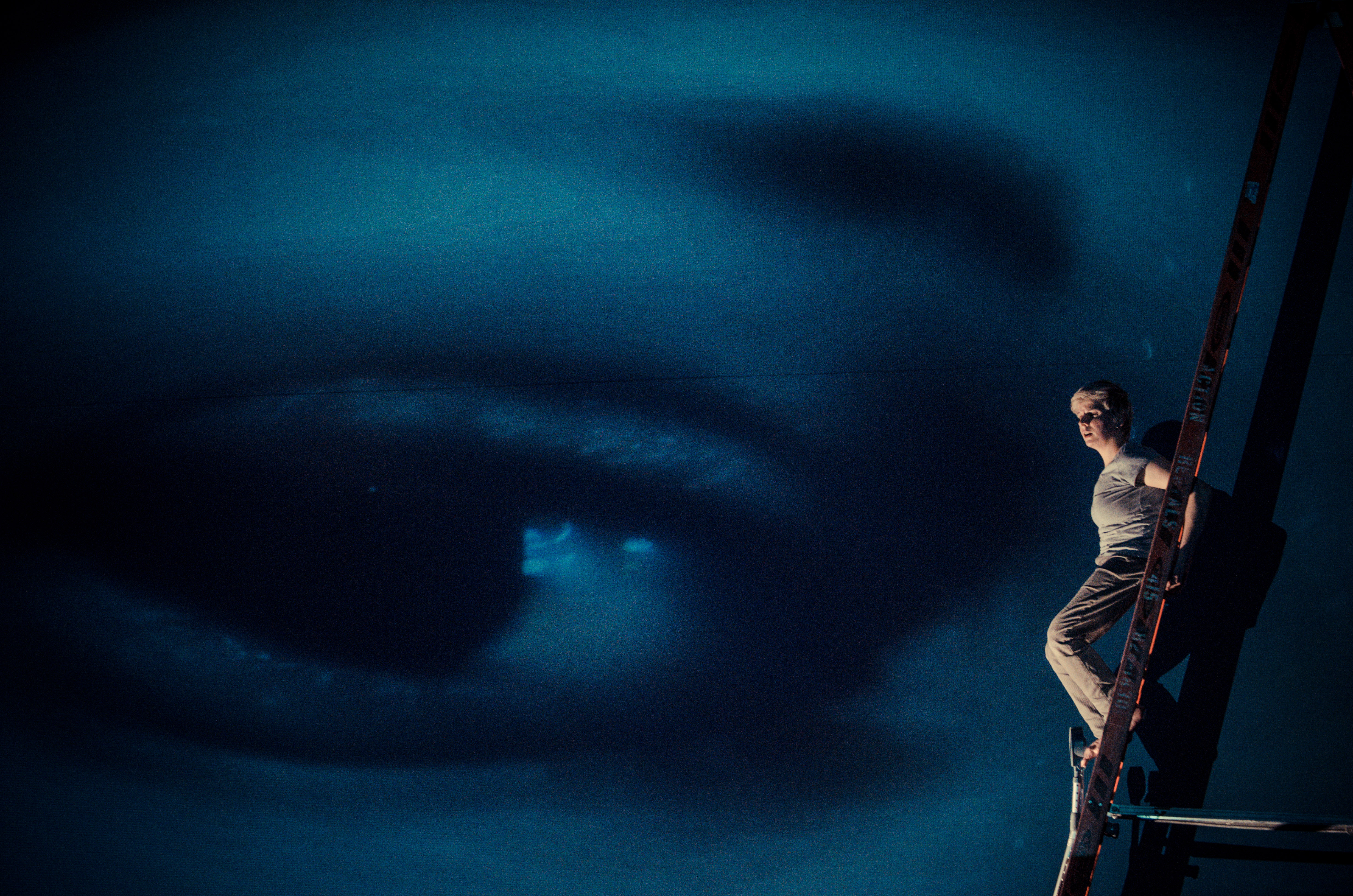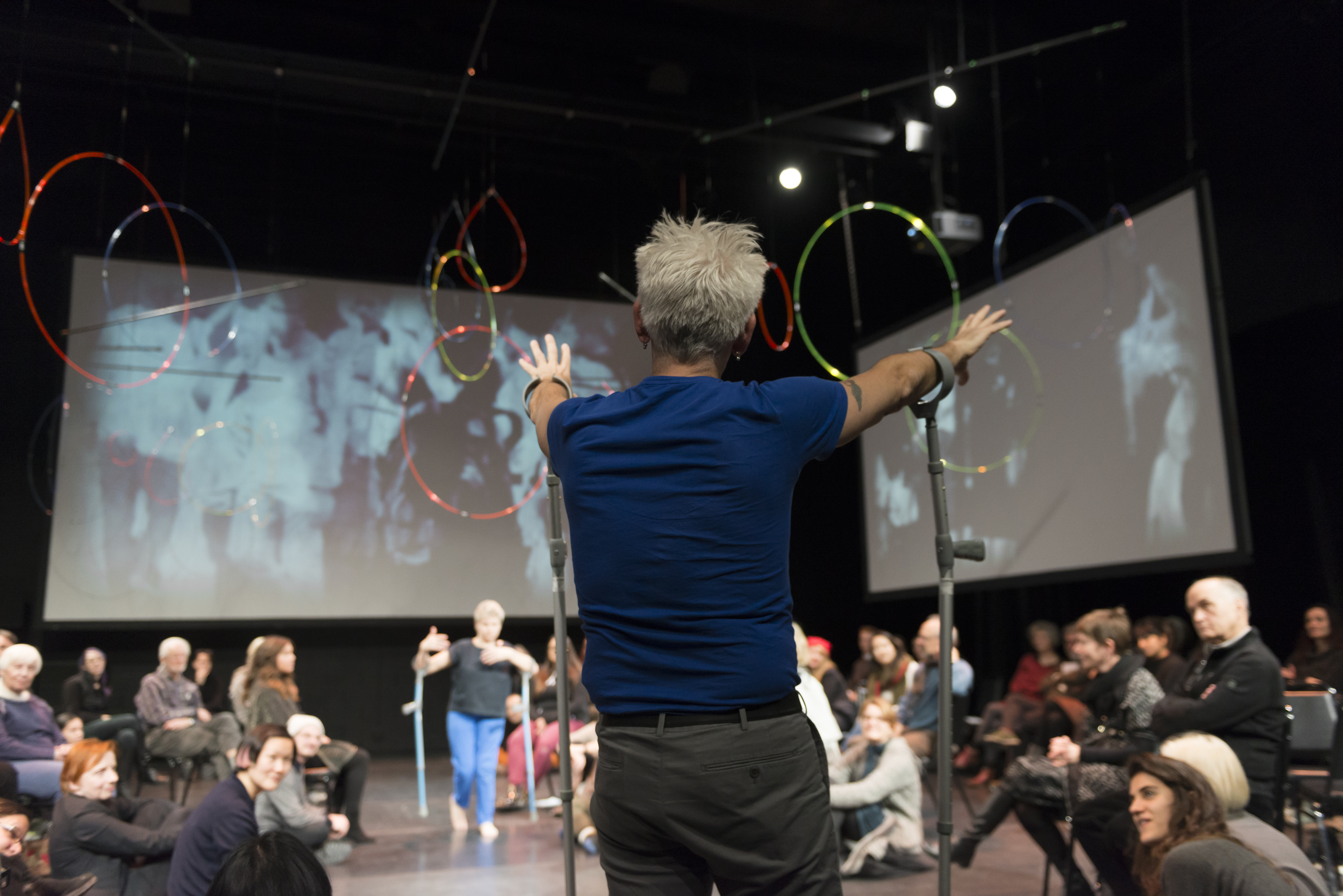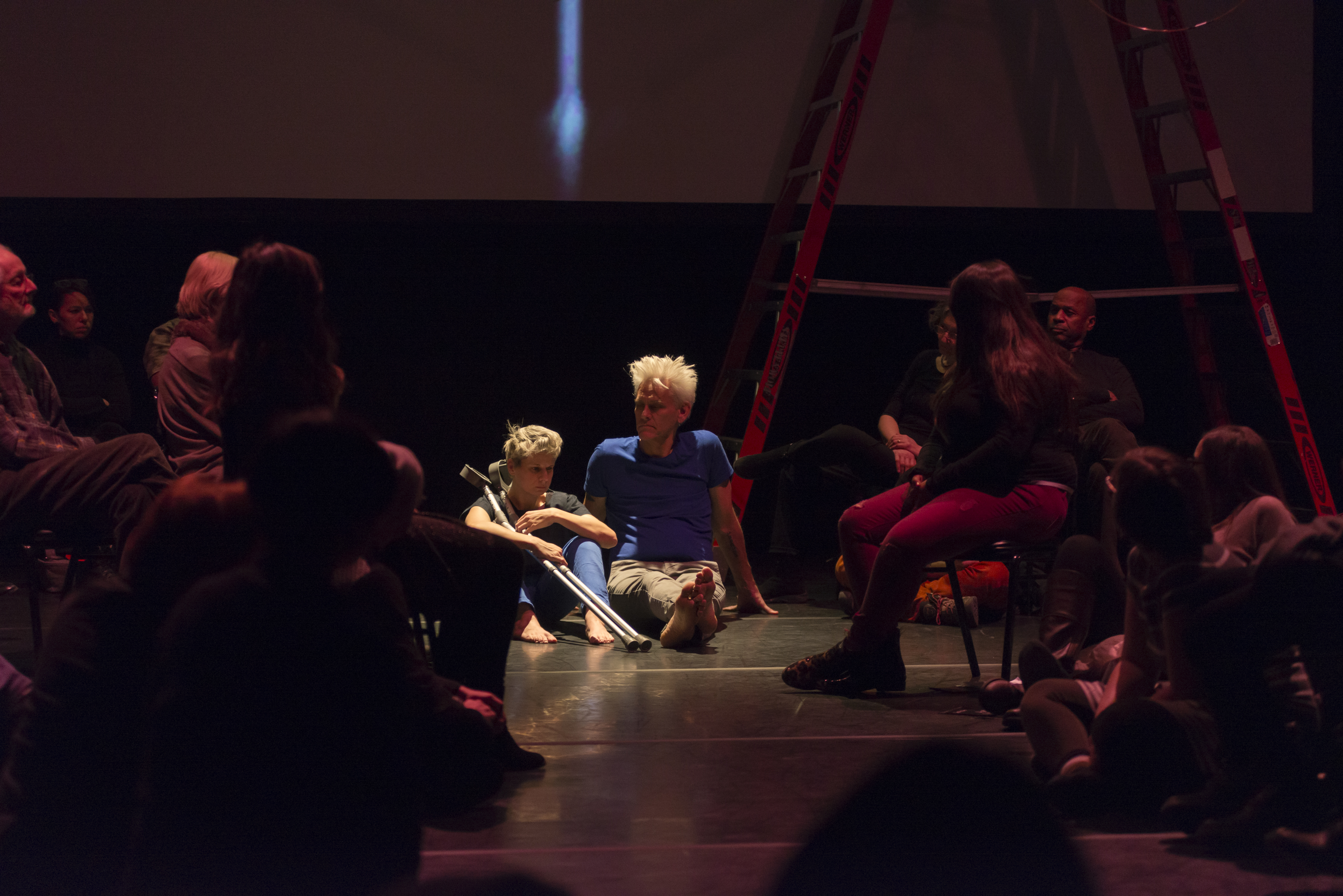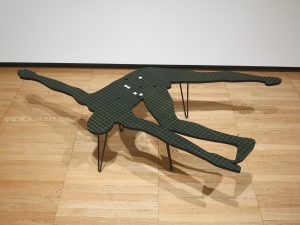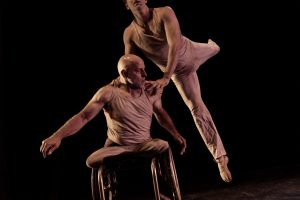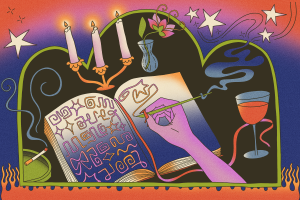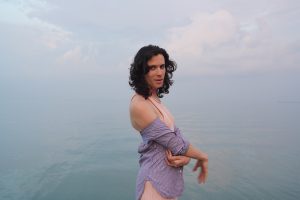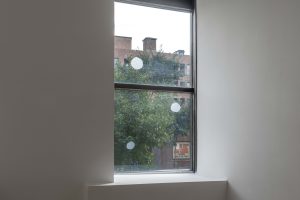Chair or floor cushion? I decided to make myself comfortable in a chair on the corner of the stage—in the midst of the action, but removed enough to observe much of what was happening at the edges of the space. This performance of Claire Cunningham & Jess Curtis’ The Way You Look (at me) Tonight was certainly relaxed. Escorted to stage level, the audience was invited to sit directly on the stage in clusters of chairs and cushions, and prompted to make themselves at home, even remove their heavy winter boots if they were so inclined.
After explaining what to expect, Cunningham and Curtis—acclaimed international theatre and dance artists—set into motion a “collage of dance, song, and text.” For roughly 100 minutes, the audience was treated to a show pendulating between humorous yet poignant moments and more classical performance segments of dance and song. (You can see a clip here). Though classical might be the wrong word, as Cunningham and Curtis’ work itself questions what we consider classic or traditional, playing with romantic ideals, gender roles, body identity, and everything in between. Speaking directly to some of these adult perspectives and concerns is one the central ideas behind the MCA’s Relaxed Performance program.
Many Americans might be familiar with the idea of sensory-friendly performances. These are often geared towards families with children on the autism spectrum. While options like this are important to have, there’s a serious lack of programming for adults with disabilities that doesn’t infantilize the audience. To bring this type of work to the MCA Stage, the museum’s Curator of Performance Yolanda Cesta Cursach looked to the U.K., an international leader in accessible practices. The museum’s pilot relaxed performance took place during the December 2016 run of Julie Atlas Muz and Mat Fraser’s Beauty and the Beast. The show deliberately used sexuality and a “healthy dose of nudity” in order to “honor and subvert some of the social undercurrents of the eighteenth-century fairy tale.” After the initial test, the MCA Stage went from one relaxed performance in a season to four, with plans to increase these offerings in the future. (Sixty readers might recall a previous look at what goes into the interpretation services of an MCA Stage piece like Faye Driscoll’s Play).
I sat down with Cursach, as well as Curatorial Assistant, Phill Cabeen, to learn a bit more about their approach to expanding access at the MCA Stage.
Courtney Graham: Given the content, The Way You Look (at me) Tonight is very much rooted in access, but how has implementing relaxed performances differed for each show?
Phill Cabeen: The work we curate lends itself to this type of program. We think of them as collaborations; this isn’t a compromise, it’s an enhancement. In some instances, we get to introduce this concept to the artists, and they get really excited about it.
Yolanda Cesta Cursach: It’s just changing how we approach the same goal—the engaged performance.
CG: What was that initial conversation like and how did you translate that to your staff?
YCC: This is the MCA’s second season partnering with Bodies of Work. We’re privileged to have earned the trust of people like Carrie Sandahl.
PC: The disability community knows that if Bodies of Work is involved, there’s going to be a level of sincerity and investment that will lead to a welcoming experience. Working with Carrie and Bodies of Work connects us to a community in Chicago that’s really open with their feedback. This feedback and criticism is what makes this possible at all.
YCC: You’re making a difference when people criticize you; I’m very comfortable with that.
CG: In a recent blog post on your website, the term “radical hospitality” to used to define your team’s approach to accessibility—not unlike the disability culture idea of “radical visibility.” How has this concept evolved at the MCA Stage?
YCC: Radical hospitality is a term that comes from Angela Davis, with “radical” meaning “the root of everything.” We’re asking—what does it mean to feel welcome? Who’s here? Who’s not here? I’m always so aware of who’s not in the room.
PC: Our frontline team really serves as a grassroots marketing effort to get the word out to their respective communities and make sure people know they’re welcome at the museum. There’s real energy around access, with support throughout the staff, at every level.
CG: Do you think the MCA can serve as a model for other Chicago institutions?
YCC: There’s no one way to do it, it’s more of a case study. Figuring it out as you go is a good process, otherwise nothing will ever change.
CG: What do you see as the future trajectory for the MCA stage and its “radical hospitality”?
PC: Our efforts have mostly been in explaining [what a relaxed performance is]; we’d love if the explanation could be assumed and the energy and enthusiasm could go into experiencing the work. Audiences come to the MCA to see something new. In the past that might have meant international work, now it includes things like integrated relaxed performances.
YCC: It’s not just a service; it’s a way of approaching creation of performance and the attitudes we can bring as audiences. Audiences engage on their own terms and feed the performance in that way. Anticipating how we might all respond, as a group, is exciting—it’s a heightened way to be in the room.
The next relaxed performance at the MCA Stage will be Kaneza Schaal’s Jack & on May 26.
Featured image: Claire Cunningham and Jess Curtis, The Way You Look (at me) Tonight. Using elbow crutches to assist her movement, Claire Cunningham walks on Jess Curtis’ body as he sprawls on the floor of the stage. Audience members appear around them, seated on chairs in a dimly-lit space. Image credit: Robbie Sweeny.
 Courtney Graham is a Chicago-based arts administrator, writer, and event planner. As a masters candidate in Arts Administration and Policy at the School of the Art Institute of Chicago, she focuses on accessibility for people with disabilities in cultural spaces. This is reflected in Courtney’s writing, which explores access and spotlights artists with disabilities. Courtney also serves as the Assistant Director of the Evening Associates at the Art Institute of Chicago. When she is not dashing from the museum to school and back, Courtney can be found embroidering, grossly over-planning for her next trip, or watching Michigan football.
Courtney Graham is a Chicago-based arts administrator, writer, and event planner. As a masters candidate in Arts Administration and Policy at the School of the Art Institute of Chicago, she focuses on accessibility for people with disabilities in cultural spaces. This is reflected in Courtney’s writing, which explores access and spotlights artists with disabilities. Courtney also serves as the Assistant Director of the Evening Associates at the Art Institute of Chicago. When she is not dashing from the museum to school and back, Courtney can be found embroidering, grossly over-planning for her next trip, or watching Michigan football.
